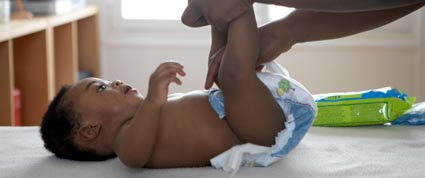
You wouldn’t think there’s much interest in a baby’s poop, but an infant’s bowel movement can tell a lot about their digestive system, food tolerances, and overall health. Below we discuss what’s normal and what’s not when it comes to the contents of your baby’s diaper.
Your Baby’s First Poop: Meconium
During pregnancy, your baby’s digestive system starts to work by swallowing amniotic fluid. Meconium, which is made up of amniotic fluid, bile, and shed skin cells, begins to collect in your baby’s intestines while they are in your womb. When your baby has their first bowel movement after birth, it will empty the collected meconium. Most babies start to pass this within 12 hours of their birth. Not passing meconium during the first 24 hours can be a sign of a complication such as an intestinal obstruction. Occasionally, babies have their first bowel movement in utero, which can cause a complication known as meconium aspiration syndrome. This is a sign that your baby is in distress.
What to Expect the First Month

Once your baby passes the meconium out of their system, the poop will begin to change color. If you are breastfeeding, your baby’s stools will be mustard colored, seedy, and runny. If you are formula feeding, they will be tan and soft. Formula-fed baby stools are firmer than breastfed babies’, but they should not be any firmer than a peanut butter consistency.
If your infant is breastfed, expect a lot of poop, at least in the beginning. Breastfed babies often have a bowel movement after every feeding for the first few weeks. Don’t be alarmed by the texture; a lot of new moms mistake breastfed stools for diarrhea, but runny and seedy stools are perfectly normal for a breastfed baby.
If your infant is formula-fed, they will poop a lot in the beginning, too. Formula-fed babies generally do not have as many bowel movements as breastfed babies, but you can expect four or five bowel movements a day in the first few weeks.
What if My Baby Is Constipated?

Once your infant is about one month old, they may start having fewer bowel movements. If your baby is breastfed, they may go several days to a week without having a bowel movement. This is nothing to worry about. Exclusively breastfed babies rarely have problems with constipation. If they go longer than a week, and/or they seem to be in pain, alert your pediatrician.
The bowel movements of formula-fed babies slow down at about a month of age as well. However, formula is more likely to cause constipation than breast milk. Most formula-fed babies will have about one bowel movement a day. The stools should be soft. If you notice your baby’s stools are firm or hard and pellet-like, it may be a sign of constipation. If your baby goes longer than two or three days without a bowel movement and they are formula-fed, alert your pediatrician.
What if My Baby Grunts or Cries When Pooping?
If your baby grunts a lot during a bowel movement, don’t worry. This is normal. Babies sometimes grunt, cry, or turn red when they have a bowel movement. This is nothing to worry about. A lot of new parents mistake this grunting for straining and constipation. Once your baby gets used to their bodily functions and how they feel, they won’t be as vocal about having them.
The Causes of Green Poop
Every now and then the notorious green poop may show up in your baby’s diaper. There are many different causes for green stools. More than likely, if it’s green you have nothing to worry about, but here are a few possibilities for its occurrence.
Iron-fortified Formula
Some formula-fed babies will develop a case of green poop from the iron in the formula they are eating. As long as your baby is happy and not having any problems with constipation, there is nothing to worry about.
Jaundice
A baby who has jaundice may produce dark or green stools. This normally goes away once the baby is off of the bilirubin lights.
Dairy Sensitivity
Some breastfed babies are extra sensitive to certain foods in their mom’s diet. If the baby has green mucousy stools, bloody stool, or is spitting up a lot or has a skin rash, they may be sensitive to something in the mother’s diet. Dairy products are one of the most common causes of food allergies in babies. If you think this might be the problem, try eliminating milk and dairy products from the mom’s diet. It may take a couple weeks to see results from a dairy elimination diet, but you could see improvement within a week. If you’re not sure, you can always eliminate the dairy for a few weeks and then drink a cup of milk to see what happens. If the symptoms come back within your breastfed baby, then dairy is probably the culprit and you should avoid it.
Foremilk/Hindmilk Imbalance
If your baby is breastfeeding and has green, frothy-looking stools, this may be a result of a foremilk/hindmilk imbalance. To put this simply, when breastfeeding, the first milk that comes out, called foremilk, is thin and low in fat. After nursing for a while, richer, fattier milk, called hindmilk, will come out. Babies who receive too much of the thin foremilk and not enough of the richer hindmilk will sometimes produce green stools and get tummy aches. If you have been switching breasts a lot instead of letting baby get a good feed on one breast, you may have problems with this.
Other Reasons
Sometimes, babies just have green colored poop. The range of color in baby’s stools can vary. Any range of yellow to green is fairly normal. If your child is gaining weight well and happy, then there is probably nothing to worry about.
The Causes of Black Poop
Black poop is caused by iron supplementation. If your baby is taking an iron supplement or is on iron-fortified formula, they may have black or darkly colored stools. However, black stools can also be a sign of intestinal bleeding. If your baby has black, tarry-looking stools, call your pediatrician.
The Causes of Blood in Baby’s Poop
It may be alarming to notice blood in your baby’s stool. However, small streaks of blood in the stool are usually not something serious. If your baby produces stools that look like dark red jelly or are streaked with mucous, you should call your pediatrician immediately. You should also call if your baby seems to be in pain or has persistent bleeding that does not go away.
There are a couple other causes of blood in the stool you may consider. This includes a small cut or tear on the baby’s anus caused by a fissure from straining during a bowel movement. Diaper rash may also cause tiny amounts of blood in the diaper from skin breakdown.
